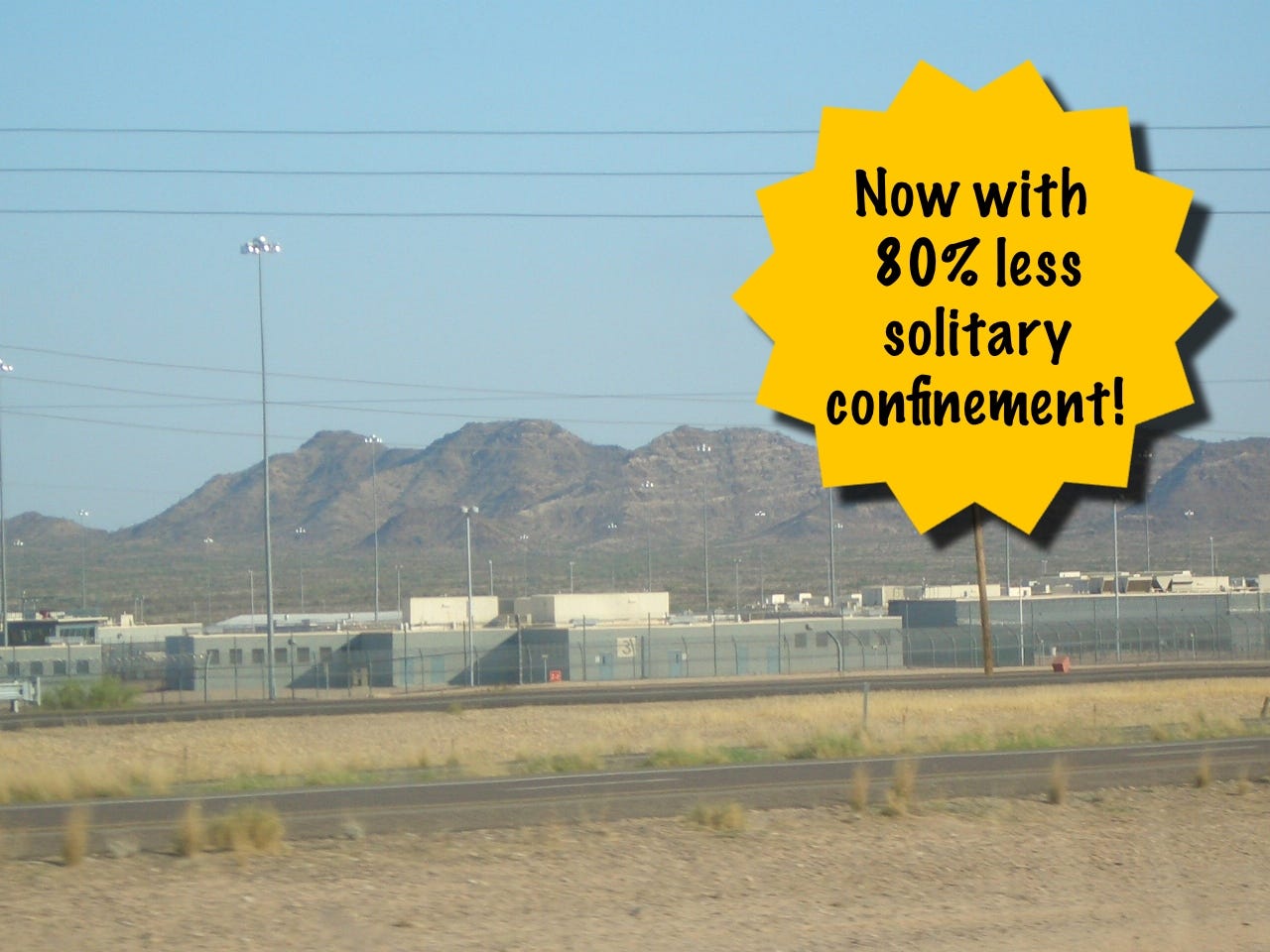Arizona Prisons Now Marginally Less Horrific, Hooray!
Some very, very low bars have been cleared. We'll take it!

We don’t get a lot of good news when it comes to prison conditions in the United States, so even a small amount of improvement is something to celebrate.
For years, the conditions in Arizona prisons have been the subject of intense scrutiny, particularly the state’s use of solitary confinement — including on children and as a way of dealing with prisoners with mental illnesses. Finally, in 2022, US District Judge Roslyn Silver found that the Arizona Department of Corrections, Rehabilitation and Reentry (ADCRR) had risen to the level of violating the Eighth Amendment’s ban on cruel and unusual punishment.
On April 12 of last year, Judge Silver issued an order of Order and Permanent Injunction requiring that the ADCRR to take steps to end “constitutional violations in the provision of health care and in housing certain prisoners in isolation.” She also required the ADCRR make improvements in several other problematic areas — for instance, to actually do something about the pest and vermin problems inside the buildings.
One year later, the ACLU reports that, while it’s clearly still a human rights nightmare over there, it’s a lot better than it was before.
[A]t the time of the order, there were 1,071 people housed in “maximum custody,” ADCRR’s euphemism for long-term solitary confinement. According to ADCRR, at least 200 people had been in maximum custody for a year or more, and six people had been in for over a decade. Today, there are just over 200 people in maximum custody – a reduction of more than 80 percent. Half the people who had been held in maximum custody for over a decade are no longer in solitary confinement.
The prisons have stopped putting prisoners under the age of 18 in solitary confinement as well.
Some general conditions have improved. Prisoners in solitary confinement — or “maximum custody” as the ADCRR calls it — now get three meals a day instead of two and aren’t accidentally kept in the shower for hours on end anymore, which was apparently a big problem before. They’re also given cleaning supplies, which one imagines probably helps with the aforementioned pests and vermin problem.
Of course, it’s not all sunshine, lollipops and rainbows:
The court ordered that one vulnerable group – people with serious mental illness – be kept out of solitary confinement altogether. There are housing units for people with serious mental illness, which ADCRR claims are not solitary confinement units. But the people inside report that they are locked in their cells more hours per day than people in the housing units ADCRR considers solitary confinement. Similarly, there is a prison in which people with dementia are held and are rarely let out of their cells, let alone allowed to go outside.
Unfortunately, it seems rather obvious that this is the kind of thing that can happen when you put corrections officers, who are not qualified to deal with people who have severe mental illnesses or dementia, in charge of people who have severe mental illnesses or dementia.
Now, I admit — I am on team prison abolition to begin with and I certainly think it’s both cruel and nonsensical to keep people who have severe mental illnesses or dementia in prisons. People tend to get their hackles up about this because they hate the idea of people who commit crimes being sent to “cushy” care facilities with people who are properly trained to care for them instead of America’s most gruesome prisons (that these are not exactly “cushy” is a conversation for another day). But does no one really consider that it’s maybe also not great to put corrections officers themselves in that position? Do we actually expect them, after six weeks of training, to know what to do if someone has a psychotic break or if someone with dementia gets agitated? Who could possibly think that’s going to end well for anyone involved?
Still, as much as I feel weird about cheering for “not leaving people trapped in their showers for hours on end” as it’s hard to imagine a lower bar, I will throw them a damn pep rally if it encourages them to do more. Good job, Arizona, on now only having three prisoners who have been in solitary confinement for over a decade, even though that’s definitely an insane thing to do to anyone! Congratulations on not putting literal children in there, either! I believe in you and your ability to treat people in a remotely humane manner! You can do anything, including not forcing people to live in cells with rats, that you put your minds to!
Good job! Ish!
PREVIOUSLY:





My dad had a reputation as one of the toughest sumbitches in the Idaho Department of Corrections. He was a lieutenant, which in the Idaho system was roughly the equivalent -- from the perspective of an inmate -- of a god on earth. He wasn't tough because he abused inmates or humiliated them. He was tough because he met with every inmate who arrived on his compound and told them, point blank, what his expectations of them were. If they met his expectations (and those imposed by the courts) they could expect, in turn, a positive evaluation to the custody review committee, Board of Pardons and Parole, or sentencing judge. If they didn't, they could expect to stay in prison. His word carried that much weight.
What is the best way to maintain security and order in a prison? Treat inmates like human beings.
We have to figure out a way to reward politicians who make conditions better for the imprisoned. American culture disincentivizes it as there's a very nasty Calvinist streak in the society at large. Think of the torture porn that comes out if you make the mistake of scrolling down to see comments on news articles about crime.
There has to be a way to decouple the "tough on crime" aspect from society. A lot of people fear crime and irrationally want to believe that being cruel to criminals punishes them (instead of just making it so they reoffend and go back in).
I really don't know what the answer is, practically. We have a moral argument for sure, but how do we convince people to put in the work to do it right?